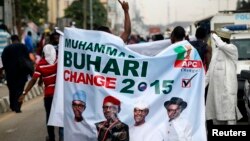Nigeria’s leading opposition party has selected a former military ruler and three-time presidential candidate to contest next year’s presidential elections.
This will be Muhammadu Buhari’s fourth run at the presidency since Nigeria returned to democracy in 1999, but this time he’ll be running under the banner of the All Progressives Congress, a new coalition of the country’s leading opposition parties.
Buhari triumphed over four other candidates, including a former vice president and the governor of the northern Kano State, to win the APC’s endorsement in primaries that finished Thursday. APC spokesman Lai Mohammed said his candidacy is a sign that Nigerians are ready for a change from President Goodluck Jonathan and his People's Democratic Party.
The APC and Buhari “have become more and more popular,” Mohammed said. "And it’s like, whoa, finally Nigerians have got a party that can replace Jonathan. And the only man that can do the job is actually General Buhari.”
Buhari was a military ruler of Nigeria from 1983 to 1985, a background that political commentator Joachim MacEbong said would shape his candidacy. MacEbong said Buhari's key themes would be corruption and security, particularly the fight against the Boko Haram insurgency in Nigeria’s northeast.
“The issues in the northeast have deteriorated, and Buhari’s past as a military ruler and also, in particular, his effectiveness in dealing with a similar extremist element in the early '80s are going to be in his favor,” MacEbong said. "So the two big issues, corruption and insecurity, I think that Buhari has an advantage on, and he can use as leverage in order to stand apart.”
While older voters may remember Buhari for his authoritarian governance, Chris Ngwodo, a political analyst, said Nigeria’s demographics might render Buhari’s background irrelevant.
“He ran a kind of authoritarian, disciplinarian regime, very strong on anti-corruption, very hard on law and order, made drug trafficking a capital offense, that sort of thing,” Ngwodo said. "That’s his record as military head of state. But the funny thing is if you look at the demographics of the country, most people were either too young or weren’t even born when he was head of state.”
Nigeria voters often choose whom to vote for based on their ethnicity or religion, MacEbong said. As a Muslim northerner, Buhari has not in the past won much support among Christians or people living in Nigeria’s south. But with the price of oil, Nigeria’s main export, dropping, the economy is likely to play a more prominent role in next year’s campaign.
“There is ethnicity there, there is religion, but then again economic factors and security factors could also become a very important narrative,” MacEbong said.
Nigeria goes to the polls to vote for president on February 14.
